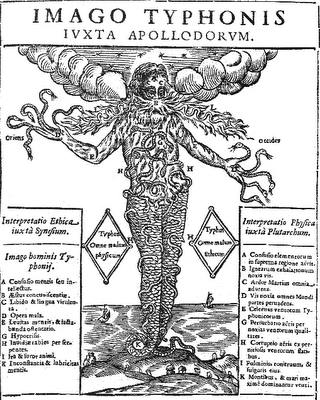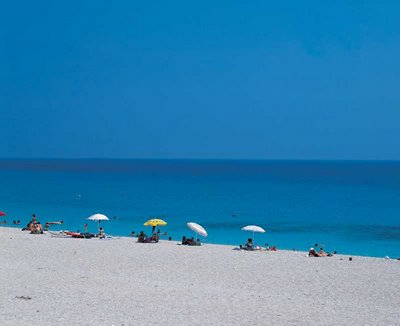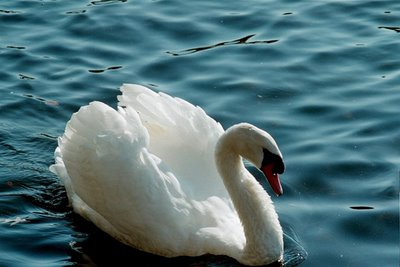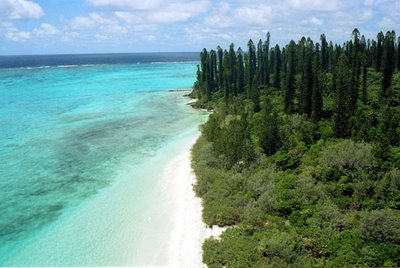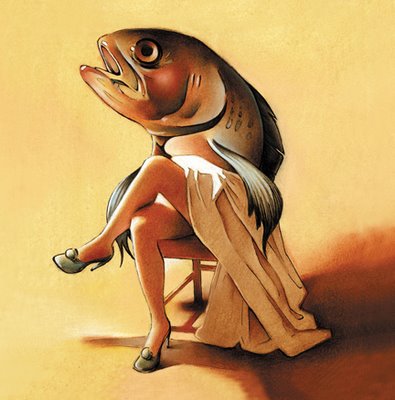Zeus and Typhon

ON ZEUS AND TYPHON,
SUMMER STORMS
& THE BRIGHTER LIGHT
OF DARKEST SEAS
The counterpart {of Yahweh’s victory over Leviathan, the serpent of the cosmic sea} for the Greeks was the victory of Zeus over Typhon, the youngest child of Gaea, the goddess Earth -- by which deed the reign of the patriarchal gods of Mount Olympus was secured over the earlier Titan broods of the great goddess mother. The Titan’s form, half man, half snake, we are told, was enormous. He was so large that his head often knocked against the stars and his arms could extend from sunrise to sunset. From his shoulders, according to Hesiod’s account, there reared a hundred serpent heads, all flashing fiery tongues, while flames darted from the many eyes. Within could be heard voices, sending out sounds the gods could understand; but also bellowing like bulls, roaring like lions, baying like dogs, or hissing, so loudly that the mountains echoed. And this terrible thing would have become the master of creation had not Zeus gone against him in combat.
Beneath the feet of the father of the gods Olympus shook as he moved, the earth groaned; and from the lightning of his bolt, as well as from the eyes and breath of his antagonist, fire was bursting over the dark sea. The ocean boiled; towering waves beat upon all promontories of the coast; the ground quaked; Hades, lord of the dead, trembled; and even Zeus himself, for a time, was unstrung. But when he had summoned again his strength, gripping his terrific weapon, the great hero sprang from his mountain and, hurling the bolt, set fire to all those flashing, bellowing, roaring, baying, hissing heads. The monster crashed to earth, and the earth-goddess Gaea groaned beneath her child. Flames went out from him, and these ran along the steep mountain forests, roaring, so hot that much of the earth dissolved, like iron in the flaming forge within the earth of the lame craftsman of the gods, Hephaestus. And then the mighty king of the gods, Zeus, prodigious in storming wrath, heaved the flaming victim into gaping Tartarus-- whence to this day there pour forth from his titan form all those winds that blow terribly across seas and bring to mortal men distress, scatter shipping, drown sailors, and ruined the beloved works of dwellers on the land with storm and dust.
-- Abridged from Hesiod’s Theogony in Joseph Campbell’s Occidental Mythology
NIGHT STORM
May 12, 2006
Wild indeed the storm which blew in
as we went to bed last night,
surprising to arrive at all in this draught
and coiled with a thousand lighting
strikes turning night to white
and back in semaphores of ancient horror,
each followed by a hollow boom
lumbering across the sky.
It rained hard on the tin roof as
we settled in, so much water pouring
off the eaves & filling the garden
& turning our bed into a boat
to ferry us across so much dark
water sleep. The storm as bliss-in-fury
flashed a dark time in my story
when such machinations of
the sky was pure whiskey on the brain,
voluptuous and cruel, the perfect trope
for annihilation’s brilliant flash
revealing every crag and cranny
of the doom I was precipice to.
She or he nearly killed me, that
Typhon of molt cries: But I got
through their nakedest of hot
summers, growing up or down
or in enough to enjoy her
rages of white deluge bereft
of Bluebeard rue and roguery.
There was a harrowing which lashed
its loins against and through
me til it ebbed in loud sounds
slowly distant, hard tenors
muting to a drone, desire soaking
down into the man as memory
and dream and reflections of
a light not meant for mortal eyes,
the ancient signature of Zeus
and Typhon writ in passing storms.
It’s cool and lush outside, a
moon near full in the west
ridden by a nearby planet --
Jupiter no doubt -- & the loved
earth fast asleep, her ravisher
twitching over the dream I write,
her son the foiled monster
breezing happily in the trees,
the master of disaster
athrone where he rules best
beneath the last line of this song.

Only then is art perfect, when it looks like nature, while nature strikes home when it conceals art within itself.
-- Heraclitus fr. A 92
***
Perfection, any kind of perfection, always demands some kind of concealment. Without hiding itself, or remaining hidden, there is no perfection. But how can the writer conceal the obviousness of the word and its figures of speech? With the light. The anonymous author writes: “And how did the rhetorician conceal the trope he was using? It’s clear that he hid it with light itself.” To conceal with light: the Greek specialty. Zeus never stopped using the light to conceal.
-- Roberto Calasso, The Marriage of Cadmus and Harmony
***
THE VILLAS OF HELIOS
The stories of the Titans are about gods
who belong to such a distant past that
we know them only from tales of a
particular kind and only a exercising
a particular function. The name Titan
has, since the most ancient times, been
deeply associated with the divinity of
the Sun, and seems originally to have
been the supreme title of beings who were,
indeed, celestial gods, but gods of very
long ago, still savage and subject to no
laws. We did not regard them as being
in any way worthy of worship; with
the single exception, perhaps, of Kronos;
and with the exception also of Helios,
if we identify the latter with the wilder,
primordial Sun-God. The Titans were
gods of a sort that have no function
except in mythology. Their function is
that of the defeated: even when they
win seeming victories -- before
the stories come to their inexorable
conclusion. These defeated ones bear the
characteristics of ancestors whose
dangerous qualities appear in their
posterity.
-- Carl Kerenyi, The Gods of the Greeks
There are fathers so ancient
only their shoulders remain
on the coasts, grey and worn,
that and all of their sunlight.
Their sons are men of obscene
power and wealth who keep
building villas of Helios,
off Ibizia and Mustique and
Villefranche-sur-Mer,
immense brilliant porticos
grander than the glittering tableau
of blue seas and skies, jewels
big enough to drown a nereid
not destined to be queen.
Their yachts are huge, they
freight enormous testicles
which hang just below the
waterline, ever on the
verge of exploding into Europa.
The men smile like boys
with teeth brilliant
as the bleached sands, aging
men with greased dark hair
and loosening bellies. They
smile full of the contempt
and arrogance of every
old father they burnt in
lust for their mothers.
Their women are
so dazzling they seem to lounge
not on chairs but the half-shell,
miracles of flesh and composure,
their naked breasts staring
back at the paparazzis like
Medusae, staring coolly
straight into the face of the sun.
Roman pillars quarried from
Northern Italy still stand
by the pool overlooking it all,
forelocks of those miserable
first men who raged and
rampaged and fell, utterly,
to uteral dooms. These sons
are so godlike their aristocrat
world exists off all the known
maps, beyond every sea to salt
the likes of you or me.
And like their shameful
ancestors, they don’t even
know it. They prate on cellphones
and wave off children. Their
eyes are blank as they scratch
at crossword puzzles in silken
cabanas which partake of them
more than they ever will of them.
No, they’ll never quite get it
that the starry infinitude of
their gold is chump change down
below where the only wealth
that matters is what’s piled
in the ruins, stripped from
the corpses as they float round
down the gullet of drowned
Helios, delicates of clout
Dis shits in abyss.
No matter: the wine today
is indescribably
smooth--a vintage of
vineyards more than three
thousand years old--and
the married sister of
his wife is smiling
back from the pool, her
eyes all of Europe's stepping
not safely to shore, oh
so ravishingly blue,
her breasts at the waterline
burning above with
every shadow of wickedness
below out of view. She’s
every shore worth assaulting,
every other man’s sworn bride
like heavy fruit for the taking.
The whole outrage of this single
sea day was baked in visage
of Helios so very long ago:
Nothing can stop him now,
ever, though he’s falling
ever back down. Atreus,
Medici, Rothschild, DeLaurentis,
with all of the bankers between,
having bought their world
and now fully in its leisure,
in Tuscan palaces of burning white
pleasure, pure testes, hammered gold,
bright gouts of red wine
spilled over and over on the
grave of wild Helios,
spots which never quite dry,
being sons themselves
of the sun which never dies.

SUMMER BURNS THE SKIN AWAY
from A Breviary
of Guitars, 2000
Summer 1982:
A lover has
no skin: no
boundary between
I and Thou
that would in
any way survive:
His heart and
cock two guitars
the world strums
antiphonally with
a brush of hair,
tits, lips: When
spring passed
into summer my
balls swole up
& my eyes
reached out into
the wet folds
of day in a
singular
tumescent
gape of raw
hunger: A
pagan sirroco
blistering both
married man
& anchorite:
In May ‘82
my zoe and
tejas broke
all barriers to
gallop frenzied
into the the
burning day: Making
up to Los’d
with a fine
dinner & feral
sex & a
blue copulate
drowse sufficient
to hold me there
for one night:
Ah but in
the very next
day, midst
hi-anx labors
in the forges
of my job and
the hamhanded
heat hammering
down through
coquina and steel
walls, all it
took that night
was one dram
of Scotch to
set me roaring
down that night
to Angel’s with
jaws open wide:
Two girls at
the bar of
this flaccid
rock club (too
much Michael
Jackson mixed
in with Loverboy
between sets),
hairdressers
dainty on the
lashes of
infinite night,
high heels
making their
asses point right
at me: One’s
a beautiful lesbian
& the other
this chunky
easy lay: Both
egging me on
with free booze
supplied by a
bartender the
fat one sucked
off just minutes
ago in the
office: The band
in red leather
and rooster
cuts hammering
out a metal
hash of UFO
and The Romantics
& the 3 of
us now drunk
& gripping &
groining on
the dance floor
till a disgusted
bartender throws
me out (OK
for the girls
to sashay so
naughty-nice):
The next day
I drove down
Orange Blossom
Trail on a day
peaking into
the 100s to
get a haircut
at their barber
college: My
car in terrible
arrears, brakes
grinding & windows
no longer rolling
down & the
a/c gone kaput:
At the college
it’s all sexual
anarchy, the
owner & his
son trying to
fuck the students
in their office,
a gay cutter
bragging of
sucking a
bakers dozen
dicks through
the gloryhole
of the adult
book store
on his lunch
break & patrons
rising from
their cheap cuts
sporting hard
staffs in their
ragged shorts:
I sweat and
lavish in
this torrent
of sexual malaise,
a heat denied
in the prison
of love, my
bog-eyed brute
balls rising
in the afternoon
into the bright
shearing chrome
of searing sin:
That night the
fat one came
over with a
bottle of baby
oil taking up
my taunt to
take it every
which way
my rooster
roistered &
& fucked her
just that way
all night, spearing
every tightened
clench she
offered -- snatch,
ass, toes, tits,
fist, mouth &
round we go
again: The sheets
of my bed the
next day an
oily sweaty
spermy cunty
ruin & the girl
stumbling out
a sore wrack
of all that,
later fat gator:
I sleep through
the day, dreaming
of islands and
naked native
women drinking
coconut milk
greedy from
from my proffered
cup & then
playing acoustic
guitars rich
with the savage
bossa nova salts
of a sea day:
Woke late in
the afternoon
as storms rumbled
overhead & then
pealing pure cracks
of release from
all that heat,
ecstatic fists
which exhilarate
and terrify: I
get up, shower off
the oil (my
knees and elbows
mapped with
burns), have
a cup of coffee
laced with Scotch,
read some DeLillo,
try to write words
on the page
to clot the guilt
and embarrassment
of surrender
to such thunder:
Creation does
not know acceptance,
I write: Good
Gawd made
cockroaches, clap,
‘n’ hangovers
too, folks: Peace
is no prerequisite
for living a life
although some
parody of it
is absolutely
necessary, the
inspirational
folly of the
whole enterprise:
Always, always
the folly, the
belief & the hope,
fanned by mere
luck and sure
despair, by
surprises which
I render into
annihilations:
Holly shows up
in the middle
of that downpour
with several
envelopes of
photos she shot
over at Daytona
Beach and
a gift for me,
Pat Matheny’s
“Offramp”: We
drink beer as
the album spins
its moody synth
washes (oh
let me praise
here that wonder
“Are You Going
With Me,” pure
bossa nova rum
dark and gorgeous
in the heart
where I still
waited for Kay
to return): Holly
tells me about
her adventures
at the beach —
photos of her
friend Kim
sucking and fucking
this male
stripper she
picked up on
the beach (white
white washes
of a room,
gauzy curtains,
sounds of ocean
filtered through
the pump of
Van Halen,
Holly on the
other end of
all this, getting
it down) & then
later herself
getting gangbanged
by Black Flag
in their van
between sets
(“eight hands in
the dark pulling
off all my clothes”):
We decide to
go over to Kim’s
to take pictures
of her looking
at pictures of
her fisting the
guy’s admirable
dick (if you’re
wondering how
we got the pix,
Holly’s brother
worked in the
darkroom at
Champagne Color):
So out into
the night in
Holly’s leaky
Volkswagen, huge
flashes arcing
like bridal
veils revealing
the frightening
height of the
storms above
& Nina Hagen
on the tape
player & Holly
chanting “Danger!
We need more
danger!”: At
Kim’s Holly
settles drenched
on her couch to
present The Book
& I shoot
shoot away:
tall Kim with
short blonde
hair & icy
blue eyes &
a flat cold
voice: I fucked
her once on
the floor of
someone’s
apartment one
too cold morning
when everyone
else had fallen
asleep (or
silent): Just
a rustle of
the clothes &
the friction
of a slickened
penis & all
around dark
& cold & darker
& colder: She
looked at the
pix like someone
appraising a
house: Nice
shots she said
so flatly, while
Holly looked
on with raging
glee: O I got
it all on film:
Off we went
back into
the storm to
drop off film
at Eckerds &
then go
see “Road Warrior,”
that purulent
extension of
the local angst,
all black leather,
purplish violence,
reptilian races
beneath that long
forsaken bloody
Australian sky,
somehow the
perfect angle
of our fall:
We walked out
of the movie
into the last
exhausted hurls
of thin humid
rain, exhilarated,
pale, frightened,
arcs of lightning
still throbbing
overhead, the
other movie patrons
firing up their
cars with nasty
barks of octane,
the lot a red
cloud of metal
violence: We
drive down to
South Orlando
& the tourist
nightmare to
Florida Festival
where Holly’s
sister Jen works:
Iggy Pop now
on the tape deck
rain, seeping through
the tatters of
the roof, slicking
us down, anointing
us with the
night’s own
baptismal fires:
Holly happy now,
chirping in a
fretless high range
about the cocks
of Black Flag
and books of
photos conned
on all our friends
caught in the
midst of their
shameful rages
and terribly
cocky about
the sort of ledge
we had driven
to far out on:
In the tented
pavilion there are
shops full of
expensive crap,
eateries, bluegrass
music in the air:
We buy cookies
& beer & take
pix of each other
and of Jen who
pastels a cute
caricature of
us together,
two sweet faced
pastel kids whose
terrors cannot
translate beneath
the translucent
tarp of this place:
Lightning flashes
penetrate dimly,
reminding us
of our feral errand:
Back into the
night, glissade
of tires on I-4
& Spandau Ballet
& XTC, blackness
wetness headlights
and neons all
extensions of
the howl: Falling
from my father’s
aether down through
Losd’s arms into
the gaping mouth
of a whore
down out the ass
of summer to
plop wet steaming
and ready for
now-celebrated
night: Winter
Park, Park Avenue
Pub, third set
of the Numbers,
Sentinel artist
John Beardsley
talking about
starting an
underground mag
& then bopping
alone out on
the dance floor
like an escaped
lunatic hit
by lightning
(a month later
John put a
gun in his
mouth & sd
adieu:) In
walk the Defectors
looking exhilarated
after trashing
the Pitcher House
Pub where they
kept hooting
for Free Bird:
Wealthy snotty
punks on the
other side
of us at the
bar boasting
of how the
broke into
a restaraunt
& stole 7
cases of beer
& were inviting
everyone to
A Party: Holly
& I take pictures
of all this, getting
it all down: Holly
departs with
the lead singer
of the Defectors
& I race up
to the Station
for one last half
hour of booze
& 140 decibel
howl: Broken
stuff everywhere,
seems some
girl went apeshit
on her boyfriend
a little earlier:
Klaus’ girlfriend
Laurie is there,
pissed at K.
for being a
drunk asshole,
inviting me to
an afterhours
party: Some
piss-smelling
house in the
cancerous bowel
of suburbia:
2 stereos
blasting different
Soft Cell and
The Scorpions:
And everyone’s
there, the band,
bartenders,
barmaids all
cutting loose: Two
German tourists
with long
hair good teeth
and ready smiles
troll the eddies
of party flesh
for some of
that American
pussy, jah, jah:
The beer is
boring and the
sense of poison
everywhere is
overwhelming:
Laurie & I
try to sneak
out the back
door but run
into Klaus: We
tell him we’re
headed out for
coffee & he eyes
me nakedly,
needy, dangerous:
Miles, rain,
utterly woven
now with the night,
the zipping of
tires over all
that inundation,
spraying the mist
on the windshield:
How far must
I go to finally
exhaust myself,
before I give
up on the
hope of harbor:
at dawn we’re
drinking beer
& listening to
the GoGos,
wearying finally
into each
other by
sure degrees:
Singing along
with the Sex
Pistols at
7 a.m. as
we marched up
to her roommate’s
room & waterbed:
In the receipt
of a terribly
long storm
of sky or heart
or balls now
20 years old
Laurie had
small account,
but in that
bed she was
that black sea’s
worn pearl,
21 or 22,
brown hair
& doe eyes,
smooth white
ass pointed up
at me with
its brown
hair pucker
and pink fuzz
below now
slobbering round
my aching
rudderless prow,
my dolphin
dicking into
the harbor
of her sweet
sweaty sluice,
her breasts not
small not large
but heaving to
and fro full of
whatever she
would eventually
give birth to
or die from,
heaving with
each long grinding
plunge as I worked
deep and deeper
into her, her
nipples very large
and hard, sweaty,
offering me
the milk of
that night’s bad
excess: distilled
to a fine sweet
bluish draught:
Year later I
picked her up
at one bar
& fucked her
in one temporary
apartment &
then a couple
years later
picked her up
at another bar
& then fucked
her in some
other temporary
place: Each
time we fucked
we were like
old soldiers
sharing the glow
of some battle
we lost long
ago: Her
nipples were
all that remained
of that former,
fragrant error:
Hard with all
I had no
lien to nurse
and now here
so belatedly
praise as
archangels of
my guitar bridge:
Sometimes my
wife thinks I
married her
for her breasts,
so elaborately
tender I am
in their caress
and praise:
I’ll follow her
upstairs at
night to watch
her change out
of work clothes,
trying only
obliquely to
catch that moment
when her breasts
swing free so
pure & naked
and pale with
sweet red brown
aurulae: She’s
made me promise
never to mention
that swing ever
in a published
poem so farewell
o light of
day this essential
poem: That
second or two
of shock and
surprise and
delight is the
last eleusinian
mystery in
this world, the
lover’s leap
which loosens
this arrow
of song from
balls to heart
through walls
out bloody and
free into the
world: Back on
Memorial Day
1982 the
moment was buried
in so massive
and feral a
night, all the
evil in that
lifeboat with us
ferrying us to
further ill: But
O how her
breasts swung
sweet and low
in my chariot,
coming for
to carry me home:
11 a.m. we
were dozing to
cartoons & there’s
a hard pounding
on the door
below, Klaus
screaming let
me in you
fuckers: We
dress fast
& Laurie
scurries down
to let him in
so the neighbors
won’t be
bothered any
more & in
bulls this
raging ranting
beast, tipped
on coke &
speed & whiskey,
having just
jogged several
miles in the
massive heat
& letting loose
the cannons:
Why did you
do this to
me everyone
thought I was
a fool at the
party she and
I were supposed
to be a thing
together would
you have
wanted me
to take &
fuck your Kay
etc etc etc
An hour of
this, accusations
tears threats,
a torrent that
finally cusps when
he throws his
plastic mug
at Laurie
splitting her
lip badly &
then slamming
out screaming
don’t follow me
I’ll kill you,
a banshee in
the quaint
suburban morning,
rains finally
yielding to
fresh summer
fury: Silence
Weeping: Blood:
I get a kleenex
and wipe her
lip, find some
ice: We lay on
the bed hugging
tightly and
slowing things
descend from the
fever pitch
of violence:
Try to laugh
& watch an
afternoon movie,
hugging —
clutching —
But the blood
and ice shard
deeply into
the caress:
Klaus calls
all day,
apologizing,
weeping, promising
to be good
forever more,
swearing off
those devil
drugs: Laurie
just whispers
stay away and
keeps hanging
up the phone:
Eventually
she relaxes
into the deep
maul of sleep
& say bye bye:
The afternoon
a million
acre ranch
of sun, rising
humidities,
huge puddles
still in the
road, exhaling
the steam of
already forgotten
fucks: Gas
on empty,
metal grinding
in the brakes
& gears of
my car:
Home later
deep in the
caul of excess
& exhaustion
& write in
my journal
Who am I?
A dick in the
rain, unharbored
from love,
attachment,
any security:
In a financial
& automotive
nightmare:
There’s a
clear line that
resulted in
this hopeless
tangle: A
blight of belief:
Or is it
just that the
alternatives
are worse?
A comedy,
the darkness
of humanity
clocked only
too well, uncovering
a diseased
tapestry when
I find I
really just
want plain pure
emotional
truth: Or
do I just want
a good story
that won’t kill
me? O
how I have
risked it all
to bask in
the lunar forge
of a ledge
no wider than
this poem:
Balanced between
holy immolation
& alcoholic
disintegration:
Twixt This
and Other
world, I and
Thou: Sword
bridge keen
as the cleft
of a woman
and carnally
crazed by
summer’s
spiritual roar:
Close the
journal feeling
weak and
terrified from
so much thrill:
I try calling
Holly (not home)
then try to
sleep: Close
to the verge
of dark I
hear a voice
calling my name
at the door:
It’s Los’d:
Beautiful
knifing pain
here, a
preterition
like an
aura deep
in her wounded
blue eyes: Is
this goodbye?
She asks: What
will you feel
when I find
someone better?
I guess I’ll
accept it, I
say, though
when she starts
crying and
walks off
I feel something
in me move,
something I
couldn’t before
name or hold onto
which then tore
loose and
followed her
into silence: Pat
Matheny’s “Are
You Going With
Me” here, walking
in that summer’s
torrential pour,
a lover who
knew better
and elected
anyway to fuck
the night instead
and so became
one of the
dark’s regular
rubes, just a
dick in the rain,
dying of thirst
in a sea of
milk:

THE DEEP END OF THE POOL
from Shamanic Letters, 2005
Shamanic initiation proper includes not
only an ecstatic experience but ... a course
in theoretical and practical instruction
too complicated to be within the grasp
of a neurotic. Whether they still are or
are not subject to real attacks of epilepsy
or hysteria, shamans, sorcerors, and
medicine men in general cannot be
regarded as merely sick; their psycho-
pathic experience has a theoretical
content. For if they have cured themselves
and are able to cure others, it is, among
other things, because they know the
mechanisms, or rather, the theory of illness.
-- Mercea Eliade, Shamanism: Archaic Techniques of Ecstasy
I.
Dear dark father far down under every
shape of the one I’ve known, I write to you
now in a letter that began when I was
delved up to the world on a wave of
bawling song: That water eddied and
swole slowly through my childhood,
cresting to a wave of malefic oh-o-swoony
height when its sexual semblance waxed
in my cresting teens, baptising me in its
blue augment long before I literally
became a man, if You know what I mean,
or I get properly now what You spleen
in my dream. Between events and our
knowledge of them is all that gets diseased
and mauled down into their awful wake,
years of twisting down abyms in a sprawl
of futile bubbles, dying in every bright
way to the dark underside which demand
descent before revealing what all mantas
shade, that gospel which You bid me
read at last beyond the lowest floating
lines which yesterday I wrote, leaving
me here to start again. But it’s all the same
event, the wound and its womb I mean,
with all the years between just peramabling
bubbles of a dream which is the real event,
its mundo, its shoving-off and every far
shore, the whole damn cathedral of
carouse at the bottom of God’s drowse.
Hell, what I see now might actually be
invoking its history, as if later reflection
could actually rouse percipient blue deeds.
Thus my ends beyond are just the oldest
rooms of a house I’ve yet to dig all full
down to, Trois-Freres that shore where
all I’ve sung matches Your voice enough
to join me amid the herd upon cave
walls, rescinding their plural deaths
in the resonance of my dust, sands
one day scattered on that one long beach
which crashes in my ear and in the shape
of every woman I loved too much to reach.
II.
Wing with me back to Chicago in the
Summer of 1974 to visit my last months
in that urban blight before taking leave
for good for college. Here is where my family
bone is broken the worst, the deep end
of that pool I call Intimacy which since
I’ve so loathed and bungled and yearned
the greatest depths of. You were spinning
fate’s wheels hard with all betters losing
worse: My father could no longer live inside
the closet of his life, and with an at-last
honest groan came out, telling my mother
me and my older brother that he was gay,
no husband of any ilk, nor much again
a father. Thus their marriage was finally
thrown in the drink and our family life
it once contained allowed to spout blood
and bloat and slowly turn over, giving up
the ghost which had darkened every
door we lived in with a closet’s gloom for
so many years. My mother, confirmed at
last of what she always knew, took my
younger brother and sister and moved south
for good to city- north- and husband-less
Orlando; my father, older brother and myself,
we lived as remnants for a while in that
now too-empty house on Fullerton
as summer cracked the Chicago in an
infernal runny roar. My father planned
to quit the church and move to New York
City’s; my brother was to move to California
where a new life might help him work
afar; and I was headed to Spokane for
school: So that last season in Chicago
was all for ending things but good, for
stumbling round the wounds like ghouls,
and pouring on the booze but good, our
thirst expanding exponentially
as Your dark mouth formed a deep end
to the hurt, a house at the bottom of
all things where bad spirits come to roar.
The echoes in that house those months
were hard and loud, each creak of a chair
around our emptied dining table sounding
in a percussive snap, beats of Your
shaman drum I guess. Scotch made
those noises mellow, even desirable,
as if the louder pain gave cause to amp
the imps of whiskey poured on ice,
one finger for divorce, two for silence
round the dinner table, three for the
sound of fast hooves away across a
frozen tundra of high emptiness. We drank
like fish that summer, my father no longer
caring much to be a father in the old way,
always there to talk and care but in no mood to warden
how much booze we drank, or sheriff
us for pouring every other octane on our
self-evicting flames. I frame that fire in Your
tinderbox dark Father, though the saying’s
hard, feral as all educations down under
I have learned must soddenly go.
Graduates of high school, family,
Christianity, and hope of saner
upper worlds, we became a drinker’s
mad fraternity, pouring booze on all that’s
spilled when faith’s been killed, when
what lives on in love’s hardest paternity.
III.
I spent some hot afternoons that summer
up on the roof of Ruth’s row house
across from our with she and her friend
Cathy, acting like soon-to-be-fully minted
adults, splayed half naked in folding chairs
beneath a turgid sun, listening to Pink Floyd
and the Doobie Brothers on rock radio &
talking about the glistening world through
a sheen of baby oil. Our desire was just
barely offshore of remittance, our good
Christianity losing the last of its embracure;
we bitched about our shitty lives and
dreamed of all we’d one day imbibe
once we figured out how to pop the cork
jammed hard in each of our young heads.
It was one of the season’s insanities, those
fleshy colloquies up high which could only
talk but never fly: a high-dive symposia
which taught that when you stand up
there long enough admiring the view,
the deep end of the pool just gets deeper and wilder and
more fierce, more quintessentially wild bllue.
We’d take turns reading from porno books
which Cathy had lifted from a brother’s stash, our voices quavering,
an infernal stillness in the air as we dared
to mouth words like cock and cunt in
so languid and labial a relish, tonguing
thrust and heaving breasts, some region
of our brains parted to spiralling orgasm
and ribbons of hot spurting come,
the three of us calm as toast upon those
folding chairs, the music tinny in its
upmost registers, while such deep bassos
roared between us, Cathy's big boobs in
in a blue bikini top bursting my every
seam, Ruth’s mouth a berry pucker saying
suck and balls and glans. It would be
a year before I dove into all that with
Ruth in splash of cerulean nitro; six months
later when, passing through Chicago in
deep winter, I plunged Cathy to the hilt
after a party in about the three seconds
it took to dive all the way at last from
that roof. Maybe now you’ll write me,
she said as I kissed her rumpled, fresh-
fucked visage at the door; I smiled and
walked forever out into the silence of her
life. That summer we just burnt our soulage
on the roof, tindering wings for later flight
when eventually and on our own we each
leapt off and flew down to our separate
histories. It was all just talk then, the
first departure from God’s higher word,
the bridge to every later ecstasy when
words became their labials. We talked
our ways off of that roof for sex, then
love, then family: But first we sang the songs,
as if by singing them at least and last
the deep end found us willing votives
when You ordained to break your Your fast.
IV.
One day I got a spider bite up near my groin
--or was that really You? The venom fanged
something which cause a riot in my flesh,
hives and bumps swelling left and right
until my groin was swelling fire. I grew
hysterical and then passed out -- perhaps
that feint my first big seizure -- coming up
from dark to fog, fumbling to the phone
to call my dad for help. Things were
indistinct a while and then I was on a
gurney in the emergency room, receiving
a shot of antihistimines. Dazed in that
freezing room of steel, I seemed only
halfway there, the other part lost in
a tundra space where merciless black horses
thundered north, their eyes so wild
with wind as to gaze on me forever there,
even as I recovered slowly from that bite.
I was welcomed back to consciousness
by a gaggle of interns and residents
led by a doc who lifted my hospital gown
to offer them all a peek at my strange
malady: they mmmmm’d as one to see
the tortured tundra round my cock. Ever
since I’ve never been much afraid of
insect bites, nor ever had another
reaction to spiders ants or wasps. Maybe
that was my only encounter yet with a bug of
true awfulness, or maybe I was simply
ripe and plucked for passage down to You,
my upper wounds like a mouth spread
wide for the host you venomed into me,
opening the way to wounds much further
down the darkest blues Fat City horned
in the hot streets of its summer.
IV.
The last month of that season before
I flew away was where, truly, I was
brined in Your pool’s deepest leagues.
We moved out of the house on Fullerton
into the church manse next to Wrigley Field,
a dirtier and more risky neighborhood
with Latin Eagles pounding tympanis
in the playground across the street
and poor white Appalachians growing
poorer up and down that sad old street.
But it was free and temporary, a good
springboard for taking our leave of the
city for good. Weekdays that August
I worked downtown in the basement of
a bank, processing checks amid a hive
of faceless clerks. The sums were vast
and tough to reconcile against the checks
that fled through my hands; the sums
were everywhere when I walked out at
dusk, gold blood painted on every downtown
dive, as if the setting sun was Hades’ coin.
(Someone else’s wealth amid our
destitution: another of the season’s
fell dichotomies.) Riding the El home
after work I watched the windows blur
on by, catching the eyes for just a flash of
some poor fuck worse off than I,
dressed in BVDs and weaving unsteadily
in a room forever far too close to the tracks.
His eyes bored into mine with every fraught
futurity I feared, but what else could I do
but drink? And so once home I happy
houred with my father and my brother,
our Scotches poured to nudge the rim,
the roars from Wrigley where the
Cubs were losing somehow approving
each hard pull which fell and fell
and fell inside. My father then was
between two augments, the church behind
him like some contemporary pagan age,
some older vision forming up ahead
where stones were bidding him to raise
old archetectures in new vision: But
that season there was only the blood
of what’s between, too clouded by
pain and fresh desire, so he drank
and hard. And my brother? Well, he was
all high-proof angst and lust, a party boy
who drove his days as if inside a burning
demo derby car, pinning foolish women
with strong hands that later came to heal
with an uncanny strength. But to get there
he too had far too much to drink. I’d
talk with them awhile getting three
Scotches down and then heading down
into the basement with three or four
beers in hand, setting them on an
Ampeg tubeless amp that was rounded
a hard glittery blue plastic plush.
I’d strap on a homemade guitar
that had given to me a year before
by the leader of hard-rocking Christian
band, when I was still devout and
white in Christ-like fealty. He gave
me the axe -- not much of one
except for the humbucker pickup
which really made the fucker squeal --
on the condition that I only play God’s
song’s, making me promise to burn
the ax if I ever wanted to play it
the devil’s way. Well, that was what I
thought to wing when You first
blew through me at fourteen; but
You obviously had other plans for me,
because by the summer I turned
seventeen I was riding wild the other
way, heading down in the profaner
song of playing loud and wild.
I’d pull on those beers and smoke my butts
and wail away on that guitar but loud,
no child or Christian or folk-guitarist
any more, winging out on boozy riffs
beyond all sight of home, to lands
I’d make a later haunted wreckage of
in the name of my slow education
in the ways of your hardest, deepest
songs. I drank and wailed upon that
cheap guitar until the song was spent
at that summer’s end, climbing on a
DC-10 to fly far west where You
took my soul and taught it how
to break what cannot bend.
V.
Of that too-loud later immrama
I save for other songs: suffice to say
the music drowned me good before
it washed me on to here. Look: I’m still
here at 6 a.m. on Thanksgiving Day 2005,
31 years after that summer which You
perched above the amps of Hell,
sitting in the same white chair I’ve sat
in for years now every morning
before first light, doing what I always do
in the center of this life. I got to this
that older way --- so wrongly, hurtfully,
and wild -- but now I come to think that
every bruise’s bruiting was meant:
Every hangover, clap, sunburn,
split finger, hysteria, swoon, seizure, and
migraine writes the miniscule You
bid me cry aloud while the deeper
majescule went on instructing me
about darker bliss of what’s remiss
and fallen and oh-so-bottomless in
the deep end of the pool. Every woman
that I’ve pressed onto as if to drink
her sex to dregs has had the same
surficial sooth, like nipplage of darker
oceans which now learn to drink
without a single curve in sight. That I’m
writing You this letter only means
I get what was written there so long
ago, or perhaps only that I’ve glimpsed
the faintest title of the work I’ve left
to do. I feel I’ve nearly finished all that
I can say about that now: whatever journeys
forth seems zipped, like the woman falling
back into the wave with a finger of kelp
obscuring what her mouth would say.
The word “shaman” may be lost as
well, its port and purpose expendable,
a coin to toss the ferryman: We’ll see.
Suffice to say here, Father, that I now
thank You for dropping me in the deep
end that summer long ago. May I carry
down still further what you bid me find there
in the undertowing tones I come to sing.

SUMMER TEMPLE
June 2004
Celtic artists loved multivalent,
ambiguous images that could be
seen as one thing from one angle
and something else from another one.
-- Nigel Pennick, Celtic Sacred Landscapes
You can only find it in the riot
of June, although some say it’s
always here, just occluded.
Shellacked with winter sun,
it’s just another roofless den.
In love’s deep and sweetened hour
it’s too windstruck, shrieking
all they can’t transform.
Only in the thick of of cloudburst
and that later doze
does the temple emerge.
Its bower harrows its
threshold, the hot cry’s out and
inner pulse, its hoarse heavy-soaked
prayers maned with brine.
Nothing else awakens the day
as this bliss, this oldest hot conceit.
Half-embrasure of the mind
and half-drowned garden
of too-intended grace,
summer’s temple is no dream,
no solstice you can leap across.
No: I come to live here along
the aeries of evaporate,
parishioner of a madness which
supplies the greenest gall
to the verdure which
leaps and spires at this dark
hour. Summer’s temple
now opens its downpouring
chancel wide. I sing in its choir here,
just one skull amid a hundred
older ones bored into
a brow of holy stone,
sea- slaked, (nearly drowned),
ready to burn it off again,
nailed to summer’s cross of fire.




